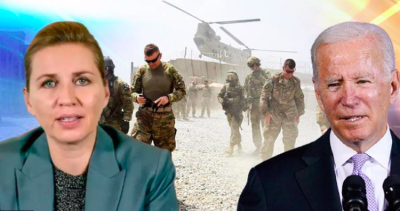US-Denmark Military Deal Affects Danish National Sovereignty

All Global Research articles can be read in 51 languages by activating the “Translate Website” drop down menu on the top banner of our home page (Desktop version).
To receive Global Research’s Daily Newsletter (selected articles), click here.
Visit and follow us on Instagram at @globalresearch_crg.
***
Recently, Copenhagen and Washington announced they are about to conclude a new defense pact, integrating the European country into the American government’s plans in light of the general security crisis on the continent. The deal, in short, allows Denmark to receive American troops in its territory without any control of quantity, which has generated contrary opinions, criticism and controversy, as it directly affects the sovereignty of the Danish state.
Pressured by tensions in Ukraine and by NATO’s narrative about an imminent risk of war, Denmark is deciding to completely abdicate its military sovereignty, allowing American troops to occupy all of its national territory, using local military bases, allocating new equipment, and carrying out all type of activity deemed necessary by the US, without any request for authorization or any prior notice to the Danish authorities. The only limit to American activities is the installation of nuclear weapons on Danish soil, which remains prohibited.
The deal is similar to the pact previously signed between the US and Norway last year, basically consisting of an abdication by the receiver country of the command of its own military forces, which will be at the service of US troops. In fact, these are not “cooperation” agreements since a relevant role is not established for the armed forces of the receiving countries. What happens is simply the total and unrestricted surrender by Norway and Denmark of their territories, military bases, soldiers, weapons and equipment to the US, in exchange for a supposed “protection” from Russia.
Although the agreement is considered strategic, appropriate and necessary by the Danish government, many critical opinions have been generated due to the truly humiliating aspect of this type of situation. Obviously, all Danish public opinion is in favor of the country having its defense capabilities improved and becoming strong in the face of any threat, guaranteeing protection to its people and territory.
The Socialist Party, for example, despite its opposition to the government, maintains a moderate stance, considering ties with NATO to be important, but severely condemns such a deal as it violates Danish sovereignty, intensifying polarizations within the alliance itself. In this regard, these were the words of Karsten Hønge, spokesperson for the Socialist Party, on a social network: “Thanks, but no thanks to American wishes for troops and materiel in Denmark. The NATO countries are being played off against each other, and Danish sovereignty is being pressured. The US is our ally, but cooperation should be kept within NATO”.
This differentiation between “cooperation” and “violation of sovereignty” has been strongly emphasized by critics of the agreement, who consider it insulting to Denmark, not beneficial to national defense. In the same vein, Red-Green Alliance’s spokeswoman Eva Flyvholm said:
“It’s fine enough with collaboration, but you don’t have to sell out completely the basic sovereignty over your own land and legal control over it”.
The agreement is not yet in force, although negotiations are being concluded quickly. The only challenge faced by the government at the moment is to form a parliamentary majority that supports the measure, but, interestingly, the case seems to be resolving. Through an alliance between conservatives and liberals, the government has had a positive dialogue with Venstre, the largest opposition party, gaining support for a possible approval of the deal.
This has been possible because the rightist orientation of Venstre, despite condemning a major part of the current government’s policies, tends to support any measure to integrate of Denmark to NATO and the US. In short, it is a party that supports the anti-Russian discourse and sees Moscow as a threat to the country. In this regard, Venstre’s spokesperson Michael Aastrup Jensen said the following: “We are clearly positive about it. It is important that we work as closely together across the Atlantic as possible. It is necessary in light of the fact that we have unfortunately got this Cold War 2.0, going on where we have a Russia that is doing some violent sabre-rattling”.
In fact, while government and opposition dialogue, time passes and the existence of a supposed Russian invasion plan seems less and less credible. NATO’s pressure to deploy American troops in as many countries as possible grows day after day, while, on the other hand, Moscow remains inert, without showing any kind of aggression, despite the insults and maneuvers of the West. That says a lot about which side really shows an interest in fomenting conflict in Europe.
Considering that such an invasion plan does not exist and the possibility of a war in Europe is practically zero, the European countries that are rushing and desperately accepting to hand over their territories to Washington in exchange for a supposed “protection” are making a big mistake. Soon, the tensions will calm down and public opinion will stop believing in the supposed Russian plan and so Denmark will understand that it has destroyed its own sovereignty for nothing.
*
Note to readers: Please click the share buttons above or below. Follow us on Instagram, @globalresearch_crg. Forward this article to your email lists. Crosspost on your blog site, internet forums. etc.
Lucas Leiroz is a research fellow in international law at the Federal University of Rio de Janeiro; geopolitical consultant.
Featured image is from InfoBrics

